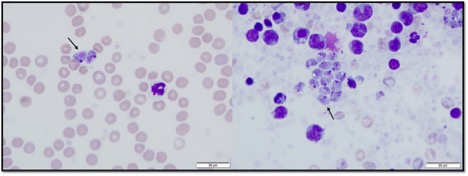Weimaraner puppy diagnosed with Chagas disease
Written by Dr. Julie Piccione, Clinical Pathology Section Head
With over 800,000 tests run annually, TVMDL encounters many challenging cases. Our case study series will highlight these interesting cases to increase awareness among veterinary and diagnostic communities.
Chagas disease was diagnosed via blood smear and buffy coat examination in a clinically ill puppy with ascites. Although classically observed as trypomastigotes (elongated forms) in fresh samples, these organisms can transform into a rounded form with storage (as depicted here). Chagas disease is caused by the protozoal organism, Trypanosoma cruzi, which is transmitted by the kissing bug. Trypomastigotes are found in the fecal matter of kissing bugs, therefore infections can occur with fecal contamination of bite wounds, broken skin, or mucous membranes (including ingestion of infected kissing bugs). While peripheral blood examination can be poorly sensitive for the diagnosis of Chagas disease, it is very specific when organisms are identified. TVMDL also offers an IFA serology test for the detection of antibodies against Trypansoma cruzi. The prognosis for Chagas disease is considered poor.
To learn more about this case, contact Dr. Julie PIccione, Clinical Pathology Section Head, at the College Station laboratory. For more information about Chagas disease and other tests offered by TVMDL, call 1.888.646.5623 or visit tvmdl.tamu.edu.
